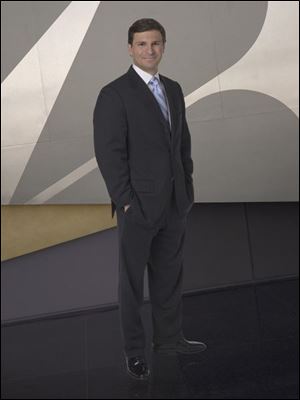
CNBC show dissects eBay phenomenon
6/29/2005
David Faber
A picture of Jesus - personally autographed by the Savior himself. A grilled cheese sandwich with the image of the Virgin Mary toasted into it. Human breast milk.
Which of these three items was NOT sold on eBay?
We'll get to that later, but in the meantime, there are plenty of other tidbits about the world's busiest Internet commerce site included in a fascinating documentary called The eBay Effect: Inside a Worldwide Obsession, which premieres at 8 tonight on cable channel CNBC.
The 90-minute program is hosted by David Faber, a member of the financial channel's signature morning show, Squawk Box. Along with his interviews and behind-the-scenes reporting, Faber even opens his own eBay account to see whether he can sell off an old collection of baseball tickets that he's had in storage for years. (As it turns out, he eventually nets a cool $85.04 for the framed set of four tickets.)
Although it's been around for less than 10 years, eBay currently boasts about 135 million customers. This year, 1.8 billion items will be listed for sale on the site, and the various fees that eBay receives for listing and selling those items, processing payments, and more will total a staggering $4.2 billion.
Not bad for an enterprise that a pony-tailed computer programmer named Pierre Omidyar put together over the Labor Day weekend back in 1995 - and contrary to Internet legend, no, he didn't do it to help his wife collect Pez dispensers. As Omidyar explains in a rare television interview, what intrigued him was the concept of an "efficient market," in which small entrepreneurs could compete fairly with the big boys.
It didn't take long before the Internet auction site became much more than a place to swap Beanie Babies. Within three years, Omidyar couldn't manage things himself, so he brought in Meg Whitman, a Harvard MBA who had been running the marketing for Hasbro's Mr. Potato Head and Playskool products.
Since then, Whitman has overseen eBay's phenomenal growth, to the point that it now has 9,000 employees and Web sites in 27 countries. Fully half of the company's revenues now come from outside the U.S.
But the company's growth hasn't been without a few bumps in the road. Earlier this year, its stock value plummeted more than 20 percent when earnings failed to meet estimates. And the company has never been a force in the major market of Japan because an e-commerce competitor, Yajoo!, gained a foothold there first.
The documentary's most interesting segments are the ones focusing on some of the hundreds of thousands of people who make a living selling stuff on eBay - indeed, if the site employed all the people who earn money selling on it, eBay would be the nation's No. 2 private employer.
Among them are a South Carolina woman who makes $50,000 a year selling designer fashion accessories and a couple in Iowa who invested $2,000 to buy videos of old movies three years ago and will make more than $1 million this year selling such videos online.
Not everyone, however, is thrilled with eBay.
A number of sellers interviewed complain about the Web site's continually increasing fees, and disgruntled traders think eBay doesn't do enough to protect buyers from fraud. In one case, three young filmmakers have to go to court when an eBay seller accepts their $1,500 but never sends them the camera they bought.
According to eBay, fraud occurs in only 1/100th of 1 percent of its transactions, but Whitman admits the company should do a better job responding to complaints.
So can you buy and sell anything on eBay? Not quite. Among the banned items are guns and Nazi paraphernalia, and a standards committee meets regularly to consider other questionable items as they come up.
The documentary shows a portion of such a meeting where one seller wants to rent out a family and another is offering breast milk for sale. Both are vetoed.
(In case you were wondering, the picture of Jesus mentioned earlier actually did sell - for about $39 - and the grilled cheese Virgin Mary went, too - for a jaw-dropping $28,000.)
It's not often that CNBC produces original material that might appeal to viewers outside of its core audience of business types and investors. The last time that Faber & Co. did such a documentary, it was The Age of Wal-Mart: Inside America's Most Powerful Company, and their insightful examination of the retailing giant won CNBC a prestigious Peabody Award. The eBay Effect is the same kind of project, and if just a fraction of the people who use the Web site tune in, it could turn out to be a ratings giant.
Look for tapes of the show to be up for sale on eBay by the end of the week.
Contact Mike Kelly at: mkelly@theblade
or 419-724-6131.